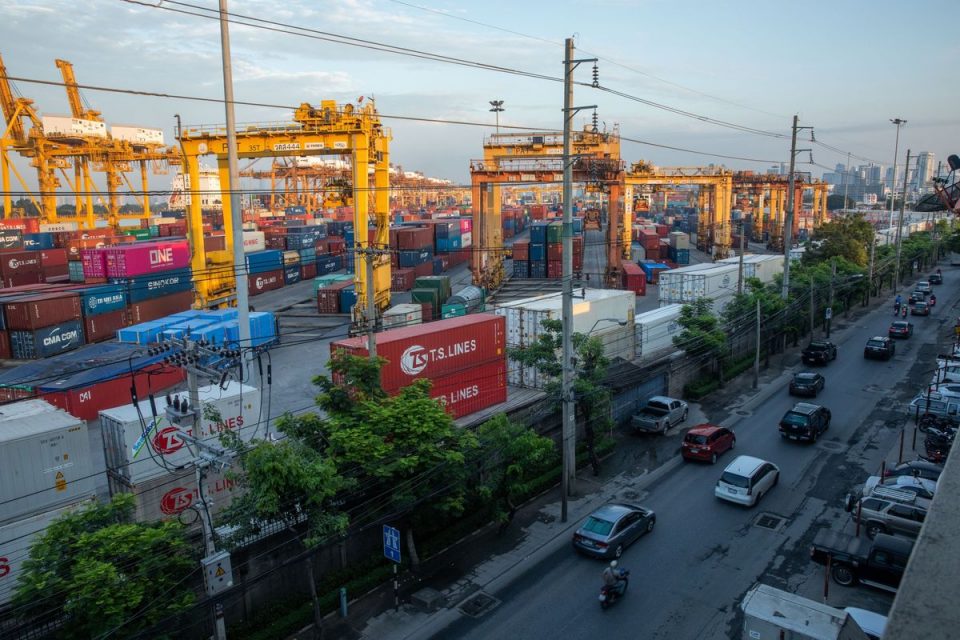For decades, Thailand had an ambitious plan of dredging a canal through the country’s narrowest point to link the Indian and the Pacific Oceans, bypassing the Strait of Malacca — one of the world’s busiest shipping lanes — and potentially cutting travel time by five days.
The plan never came to fruition, partly because the cost involved in such a project and the environmental destruction it would ensue. But as the narrow sea lane between Indonesia, Malaysia and Singapore gets more congested, the Thai government is revisiting a plan for a bypass linking the Asia-Pacific region with India and the Middle East.

To avoid dredging a canal, the government proposes an alternative pathway through its southern isthmus. It plans to build two automated seaports — one on the Indian Ocean side and another on the Pacific side — and link the ports with a 100-kilometer expressway and rail network to transport goods between them.
The country is now in the process of examining the plan. Transport Minister Saksiam Chidchob expects this “land bridge” to cut shipping time by at least two days and see some of ships diverting through the Thai bypass to avoid the crowded Strait of Malacca.
The bypass shows Thailand’s ambition to become the region’s transport and logistics hub, an idea that’s supported by its location in the middle of mainland Southeast Asia. Its other plans include a rail and highway network linking neighboring countries, an aviation city supporting its industrial corridor and a planned high-speed rail network linking China to Singapore through the Thai capital of Bangkok.
—Randy Thanthong-Knight in Bankgkok
Charted Territory

China has halted imports of pork from Germany and will destroy existing supplies on concern about a pig-killing disease. Germany, which counts on China for almost two-thirds of its pork exports outside of the EU, confirmed a case of African swine fever last week. That caused South Korea and Japan to suspend purchases, and Taiwan to begin inspecting the luggage of passengers from the European nation. The outbreak is giving a lift to U.S. livestock farmers, who have been battered by the coronavirus pandemic that shut meat-processing plants.
Today’s Must Reads
- Picture finish | Oracle edged out rival Microsoft in negotiations for the U.S. operations of TikTok, people familiar with the talks said, as the Chinese-owned music-video app attempts to avoid getting shut down in a clash between the world’s two superpowers.
- EU-China summit | Chinese President Xi Jinping is set to hold talks with German Chancellor Angela Merkel and European Union leaders on Monday, as Beijing seeks to keep the continent from aligning more closely with the U.S. on disputes ranging from market access to human rights.
- Failing playbook | President Donald Trump is reviving his 2016 campaign playbook on attacking China, but running as the incumbent means defending a record of only limited success in rewriting the economic relationship with Beijing. Meanwhile, here’s how the Trump and Joe Biden’s economic ideas stack up in some key areas.
- Next step | Prime Minister Boris Johnson will send his Brexit law-breaking proposals to Parliament this week, facing a growing rebellion from his MPs and further criticism from former premiers and EU leaders.
- Growing distrust | Taiwan sits squarely in the middle of the worsening dispute between Beijing and Washington, with many of its companies operating factories in China manufacturing for American firms. Those tensions are pushing Taiwanese companies to relocate some production back home and also redirect money to factories on their side of the strait.
- Stuck in the middle | Southeast Asian countries don’t want to be caught between competing major countries, Vietnam’s Foreign Minister Pham Binh Minh said at the conclusion of virtual meetings that featured flare-ups between the U.S. and China.
- Second wind | Lufthansa’s aging fleet of MD-11 freighters are getting a new lease on life due to a boom in cargo rates.
- More influence | Trump’s candidate, Mauricio Claver-Carone, won the election to lead the Inter-American Development Bank, placing an American at the head of the important lender as he looks to counter China’s influence in the region.
- WTO threats | Trump demanded that Roberto Azevedo, who was the WTO’s director-general, designate the U.S. a “developing nation” like China and India in order to get more favorable trading terms, the president told Bob Woodward in a Jan. 22 interview, according to a new book by the journalist. When Azevedo objected, Trump said, “Here’s what I’m doing: I’m pulling out of the World Trade Organization.”
On the Bloomberg Terminal
- Other beneficiaries | The heightened geopolitical pressure enveloping Huawei’s 5G networking gear is a sales opportunity for Marvell, according to Bloomberg Intelligence.
- Win win | Food producers could reduce their carbon dioxide output by 3.3 billion metric tons annually if they eliminated the one-third of food that’s lost or wasted in the production and supply chains, Bloomberg Intelligence says.
- Use the AHOY function to track global commodities trade flows.
- Click HERE for automated stories about supply chains.
- See BNEF for BloombergNEF’s analysis of clean energy, advanced transport, digital industry, innovative materials, and commodities.
- Click VRUS on the terminal for news and data on the coronavirus and here for maps and charts.
Like Supply Lines?
Don’t keep it to yourself. Colleagues and friends can sign up here. We also publish Balance of Power, a daily briefing on the latest in global politics.
For even more: Follow @economics on Twitter and subscribe to Bloomberg All Access for full global news coverage and two in-depth daily newsletters, The Bloomberg Open and The Bloomberg Close.
How are we doing? We want to hear what you think about this newsletter. Let our trade tsar know.


